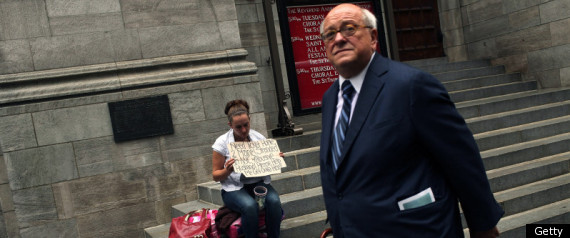 The promise of the American dream has given many hope that they themselves could one day rise up the economic ladder. But according to a study released Tuesday, those already in financially-stable circumstances should fear falling down a few rungs too.
The promise of the American dream has given many hope that they themselves could one day rise up the economic ladder. But according to a study released Tuesday, those already in financially-stable circumstances should fear falling down a few rungs too.The study, by the Pew Charitable Trusts, found that nearly a third of Americans who were part of the middle class as teenagers in the 1970s have fallen out of it as adults. Though Pew examined only a certain demographic swath of participants, its findings suggest the relative ease with which people in the U.S. can end up in low-income, low-opportunity lifestyles -- even if they started out with a number of advantages.
Though the American middle class has been repeatedly invoked as a key factor in any economic turnaround, numerous reports have suggested that the middle class enjoys less existential security than it did a generation ago, thanks to stagnating incomes and the decline of the industrial sector.
The study stops tracking data in 2006, meaning that it remains unknown how the economic slowdown of recent years -- including a crisis in the financial system, a housing market weighed down by foreclosures, soaring unemployment and a global recession -- may have affected the likelihood that more Americans born into middle-class circumstances will tumble out of them.
The Pew study looked at Americans who were between the ages of 14 and 17 in 1979, and living at home with their parents that year. For teenagers who were part of the middle class in 1979 -- defined as the 30th through 70th percentile of income -- about 28 percent of them had fallen out of it, meaning below the 30th percentile of income, by 2006.
This kind of decline in fortunes did not affect all races and genders uniformly. Middle-class blacks, for example, stood a 37 percent chance of falling out of the middle class, compared with just a 25 percent chance for whites. And white women had a 30 percent chance of falling below the 30th-percentile line, whereas white men had only a 21 percent chance.
The researchers observed a few correlations between downward mobility and certain kids of behavior. The study notes that people who did not pursue their education past high school, who had used heroin or cocaine, who had performed poorly on standardized tests, or who had gotten divorced or never been married had a higher likelihood of falling out of the middle class.
Prolonged unemployment is taking its toll on many middle-class Americans, as they see opportunities receding and employers increasingly hiring applicants who already have jobs or who have only been out of work a short period of time.
While the U.S. economy officially climbed out of recession two years ago, growth has been painfully slow since then, and in recent months has threatened to come to a standstill. Most analysts agree that the country needs to be expanding at more than twice its current rate in order to lift the economy out of its doldrums.
Origin
Source: Huffington
No comments:
Post a Comment